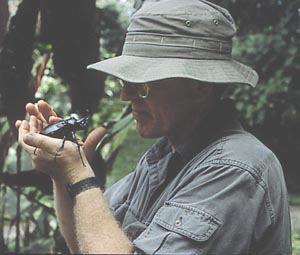|
Home > Resources > Extreme Scientists > Entomologist
Entomologist: Brett Ratcliffe
Dr. Ratcliffe
is seen here hunkering down in the mountains of Panama in Central America
to collect rhinoceros
beetles. He is studying these awesome
giants of the bug world to understand the ecology, history and distribution
of them in Costa Rica and Panama. Rhinoceros beetles belong to the family Scarabaeidae which is the fifth largest family of beetles, with
nearly 30,000 species known! And guess what? There are even more species
that aren't yet known. More species are found in Central and South America
than in any other part of the world!
"The Dynastinae is one of the most conspicuous subfamilies of Scarabaeidae,
and it occurs in all the major biogeographic regions of the world. About
1,400 species of dynastines are known although the actual numbers of
them will probably reach 2,000."
Dr. Ratcliffe: What's He Doing?
The
objectives of the project he is working on are : (1) to create a collection
of beetles from Costa Rica, Panama, and the United States and (2)
to publish a well-illustrated field manual which details all the Dynastinae
of Panama and Costa Rica. Included in the manual will be descriptions
of all species, geographical and temporal distributions, ecological
and life history data, and both English and Spanish keys to identify
the species.
 The users
of the manual he is helping to create would be; Costa Rican and Panamanian
scientists and students studying their local fauna; ecologists who encounter
these insects in their studies and who need identifications and information
on biology and distribution; biogeographers needing distributional data;
park and reserve managers needing to establish management plans, educational
programs, or research opportunities; applied entomologists in each country
requiring information about pest status; and a whole lot of regular
people who just like to read about and collect beetles for fun. Collecting and keeping large beetles for pets is popular in Japan. The users
of the manual he is helping to create would be; Costa Rican and Panamanian
scientists and students studying their local fauna; ecologists who encounter
these insects in their studies and who need identifications and information
on biology and distribution; biogeographers needing distributional data;
park and reserve managers needing to establish management plans, educational
programs, or research opportunities; applied entomologists in each country
requiring information about pest status; and a whole lot of regular
people who just like to read about and collect beetles for fun. Collecting and keeping large beetles for pets is popular in Japan.
Costa
Rica and Panama are small countries that are rich in diverse animals
and plants. But they are also countries of intense land development
where pristine areas are being developed by humans. Knowledge about
the plants and animals of a country helps to keep delicate ecosystems
intact. Inventories, such as the one Dr. Ratcliffe is working to create,
are basic to that understanding.
"In
order to arrive at a sound view of ecology in tropical ecosystems,
we must first identify and catalog the fauna. The growing recognition
of the importance to humankind of tropical forests and the mounting
concern for their future is well known. The pace of basic research
in the tropics must be accelerated, and failure to do so will eventually
limit our capability to contribute solutions to impending scientific
and human problems." Dr. Ratcliffe
It's scientists
like Dr. Ratcliffe who go out into the world and scope out more bugs,
identify and catalog them. As a scientist out in the field Dr. Ratcliffe
gets to experience the excitement of being the first human being to
see new species of beetles that have never before been identified. Talk
about trailblazing!
Other Cool Stuff...
Here are
some of the practical skills that Dr. Ratcliffe uses on the job everyday
that were learned OUTSIDE the classroom:
1. Camping,
backpacking: learned in Boy Scouts.
2. Driving a 4-wheel
drive vehicle: learned on-the-job.
3. Speaking a foreign
language: "What you learn in school is O.K., but it is not the
same thing as learning it IN a foreign country speaking to the people
with whom you are working."
4. Collecting insects
& making an insect collection: "This was a hobby when I was
a kid."
(Also, Boy Scouts has
an Insect Life merit badge, and there is an extensive 4-H program
dealing with insect collecting and study)
5. Geography: "There
are so many neat places to see in the world. I studied up on where
these were so that I would know more about them and where I would
like to go to conduct my studies.
|

